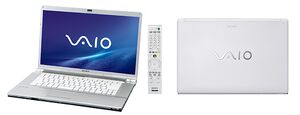VGN-FW: Difference between revisions
More actions
Romanio0089 (talk | contribs) mNo edit summary |
Romanio0089 (talk | contribs) mNo edit summary |
||
| Line 24: | Line 24: | ||
== Daily Usage Today == | == Daily Usage Today == | ||
The FW series is still very usable today. Depending on your model of dedicated GPU, you can do some very light gaming. Otherwise, | The FW series is still very usable today. Depending on your model of dedicated GPU, you can do some very light gaming. Otherwise, they are excellent for content consumption, especially the models with the 1080p display. Web browsing and office tasks are easily done on these machines. Windows 11 runs correctly, however Windows 7 or Linux the best choice for these devices. | ||
The VAIO Library recommends to upgrade the HDD to an SSD, and to upgrade the RAM to at least 4GB, or 8GB if you want to break the bank. | The VAIO Library recommends to upgrade the HDD to an SSD, and to upgrade the RAM to at least 4GB, or 8GB if you want to break the bank. | ||
Revision as of 22:50, 31 January 2022

Overview
The Sony VAIO VGN-FW series is a mid to high-end mainstream laptop computer range that was released by Sony in 2008. They were mostly intended for home use.


The FW series were one of the first laptops that featured 1080p widescreen LCDs on certain models. They include "Penryn" Intel Core 2 Duo processors, and a optional middle-class ATI Mobility Radeon HD 3470/3650 that were later replaced by the HD 4650. At the time, people wanted the FW to have a better, higher-end GPU, however Sony didn't offer that.

They featured Sony's iconic cylinder design power button, and were mostly built out of plastic for the common silver models. Only the lid was made of magnesium. However, Sony offered Signature and black variants that are so rare, we couldn't find any reviews about them. It is possible that the rarer black models and the Nebula Signature editions are made of a metal build instead of plastic. The second Signature Edition that was offered was a standard FW with a special futuristic lid. The lid has a glossy finish, and the rest of the device is just a standard silver FW. There was also white models that appear only in Japan, so we can assume they were only sold there.

The FW series run on DDR2 RAM that are upgradable up to 8GB. Good luck finding 4GB sticks of DDR2 ! They shipped with Windows Vista and Windows 7, but the latter was way more common.
No special security features or a fingerprint sensor were included, which makes sense for a laptop intended for home use.
Detailed Specs
Processor : "Penryn" Intel Core 2 Duo (not soldered)
Graphics : ATI Mobility Radeon HD 3470, HD 3650, or HD 4650
RAM : DDR2 (not soldered) (upgradable to 8GB)
Display : 1600x900, or 1920x1080 16.4" widescreen Sony X-Black LCD
Storage : 2.5" SATA
Weight : 3.1 kg
Daily Usage Today
The FW series is still very usable today. Depending on your model of dedicated GPU, you can do some very light gaming. Otherwise, they are excellent for content consumption, especially the models with the 1080p display. Web browsing and office tasks are easily done on these machines. Windows 11 runs correctly, however Windows 7 or Linux the best choice for these devices.
The VAIO Library recommends to upgrade the HDD to an SSD, and to upgrade the RAM to at least 4GB, or 8GB if you want to break the bank.
Ressources
YouTube videos :
The VAIO FW Wins Over Mother and Son in Microsoft Commercial, by Sony
The Sony VAIO FW Nebula Signature Collection VGN-FW590, by Martin L
Hands-on With The Sony VAIO FW Signature Collection VGN-FW590FFD, by sonyinsider
Downloads
Follow our guides to download and install drivers. Recovery discs are also avaliable, and will be downloadable very soon.
Sources
Sony, Wikipedia, and NotebookCheck
